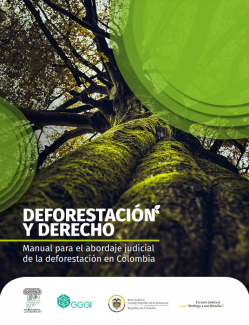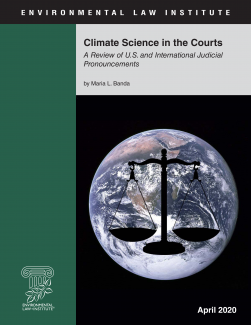Deforestación y Derecho

El presente Manual Judicial proporciona recursos que los jueces pueden aplicar para decidir casos relacionados con la deforestación en Colombia, y esta introducción proporciona un contexto para el desarrollo del manual, reconoce a los socios y a los individuos responsables del desarrollo del mismo, y proporciona una breve descripción sobre cómo utilizarlo.
Past Judicial Education Trainings
- Climate Science Session at MA Federal Judicial Retreat (Lenox — 2022)
- Judicial Leaders in Climate Science Program (Reno and Woods Hole — 2022)
- Environmental Law Essentials for the Judiciary (Napa — 2021)
- Climate Science for Judges Seminar (Atlanta — 2020)
- Plenary Session on Climate Science with the Ninth Federal Circuit (Palm Springs — 2020)
- Climate Science for Judges Seminar (Chicago — 2019)
- Climate Science for Judges Seminar (Berkeley — 2019)
- Climate Science for Judges Seminar (Washington, DC — 2019)
- Cl
Climate Science in the Courts: A Review of U.S. and International Judicial Pronouncements

Climate change has been the subject of considerable political controversy in the United States, and climate skepticism—or doubts about the basics of climate science—have not been uncommon in the public debate. At the same time, U.S. courts in several recent high-profile cases, including Juliana v. United States and City of Oakland v.
Recent Projects
Educating Judges on the Basics of Climate Science
For details about our judicial education on climate science, visit the Climate Judiciary Project page.
Clone of Training
-
Capacity Building Workshop on the Application of Environmental Laws -- Mamou, Guinea (2013)
-
Management of Scientific Evidence and Environmental Damage, Mexican Institute of the Federal Judiciary -- Mexico City, Mexico (2013)
Judicial Education in Action: Americas
ELI has conducted many programs in Central and South America and the Caribbean. A common theme in many of these locations is the threat to biodiversity by deforestation and other habitat destruction from a variety of causes, including development and infrastructure projects and contamination of fragile forest, freshwater, and marine ecosystems.
Judicial Education in Action: Africa
ELI has pioneered judicial education in environmental law in both the U.S. and developing countries. Working with local partners, the Institute has developed educational programs and materials for approximately 1,000 judges in 16 countries. These courses incorporate the latest advances in legal, scientific, public health, and economic analysis.